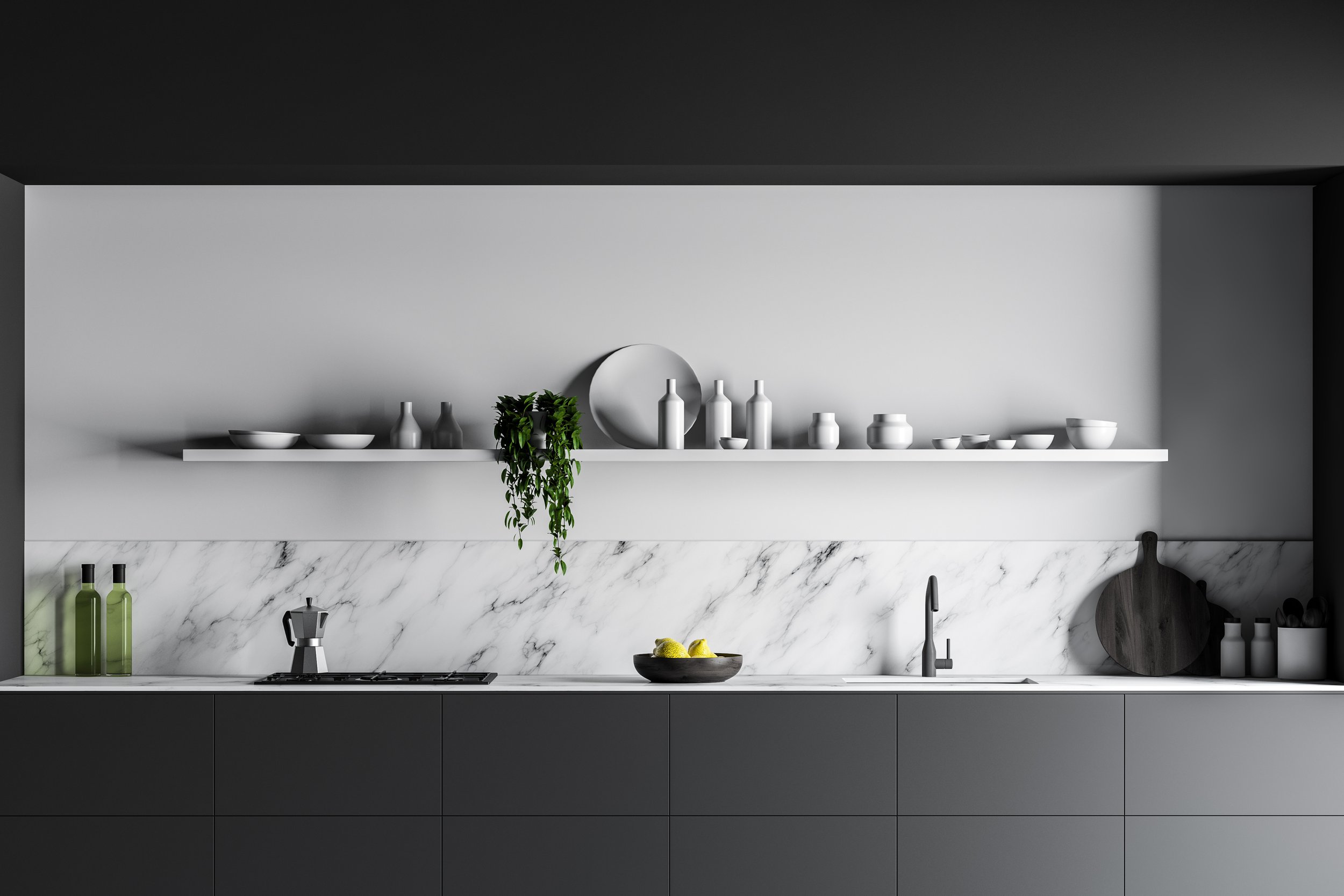
Care Instructions
Different cleaning methods will apply depending on whether your surface is natural or engineered.
See our Natural and Engineered Cleaning Guides below or click on your supplier logo for specific recommendations:
NATURAL STONE
Daily Care Tips:
Use placemats when eating at your marble or granite counter.
Never place hot pots or cookware on a stone surface. Always use a trivet.
Coasters should be placed under all glasses but particularly those holding drinks containing acidic juices or alcohol, particularly wine.
Wipe up spills right away, even though your stone is sealed. Things that can permanently ruin stone include perfume, aftershave, cologne, nail polish and nail polish remover, salad dressing, yogurt, tomato sauce, wine, lemonade and orange juice.
Use mild soap and water to clean the stone surface.
Dry using a microfiber cloth to enhance surface shine.
Never use abrasive cleansers or scouring pads as they can scratch stone surfaces.
Do not disinfect the stone surfaces with bleach or ammonia (including glass cleaner) or natural products like vinegar (acidic) and baking soda (alkali). Read the label of any cleaning product to make sure it is safe for stone before using.
Have your surfaces professionally polished and sealed annually to preserve their longevity and shine.
ENGINEERED STONE
Daily Care Tips:
Use placemats and/or coasters when eating or drinking at your counter.
Never place hot pots or cookware directly onto the surface. Always use a trivet.
For general cleaning, simply wipe the surface with a damp cloth and mild detergent.
Dry using a microfiber cloth to enhance surface shine.
Never use abrasive cleansers or scouring pads as they can scratch stone surfaces.
Wipe off spilled liquids and food immediately.
Note: Do not use cleaning products with a high Ph level as these may cause damage to your surface - This includes Oven Cleaners and any citrus based cleaners.
Archant Quartz is a non-porous surface due to advanced manufacturing process where natural resins are used to seal the surface. This makes the surface highly resistant staining from daily household products such as coffee, wine, lemon juice, olive oil, vinegar and makeup.
Daily Care Tips:
Care and cleanliness is the secret to ensuring your surface retains its beauty. Being quartz based means your surface will resist permanent staining when exposed to common household liquids like wine, tea, vinegar, fizzy drink, vegetables oil, coffee, and grease. We do recommend spills are wiped up as soon as possible because it is easier to deal with a spill than a dried stain.
Your daily maintenance should consist of wiping your bench top surface with a soft sponge or cloth and warm soapy water (mild detergent). Archant cleaner is specifically designed for Archant surfaces and is the prefect formulation for a sparkling clean spotless surface.
Before using any cleaning product check it does not contain trichloroethane, methylene chloride or high levels of alkaline/pH. If your bench top is exposed to any of these damaging products, rinse immediately with water to neutralise the chemicals.
Need a little extra help? See the Archant Care & Maintenance menu below or download the care pdf here.
-
To remove these, use a nonabrasive household cleaner such as Simple Green along with a soft damp cloth.
For persistent stains carefully use a light acid-based detergent such as Jif or citrus cleaner.
Thanks to the outstanding compactness of the material, the rough side of kitchen sponges may also be used.
Avoid cleaning the surfaces with denatured alcohol which might leave streaks that are difficult to remove when it dries.
-
Although quartz is resistant to high temperatures, prolonged direct contact with or radiated heat from pots and pans can cause damage. We recommend using potholders to avoid direct contact with your Archant bench top as overheated objects or flames might result in permanent marks or cracks created by thermal shock.
-
While resistant to scores and scratches we recommend always using a chopping board to preserve the original appearance of the bench top.
-
With strength built to last, it is not advisable to stand or sit on your counter, and make sure blunt objects don’t fall on the counter. When washing heavy items such as cast iron pans take care to place them gently onto the bench top. Like a glass table if you hit your bench top with enough force you could cause damage.
-
Avoid cleaning the bench top with products containing bleach or with a high basic pH level as they may create whitish streaks.
Other products that may mark the surface are industrial solvents, hydrofluoric acid, caustic soda, and varnish solvents.
Grease-removal detergents for the kitchen may be used but once the stain has been removed, the area must be rinsed thoroughly with water. “Grease-removal” products are usually “basic” and, if left to act on a quartz agglomerate for a long time they might change the surface, leaving stains (they react with the resin content).
CDK recommends using the Lithofin cleaning range when caring for their range of stone products. There are numerous applications areas for the LITHOFIN product range. The applications include the treatment of ceramic and porcelain tiles, terracotta and cotto, natural and concrete stone, quartz composite as well as little helpers for around the home.
Daily Care Tips:
Keep your looking perfect with Lithofin. These high quality maintenance products are designed to leave the surface hygienically clean, preserve the impregnating sealers and enhance the colour of the material. The below video (see link) shows you how easy it is to maintain your Natural Stone with Lithofin MN Easy-Clean.
See the full Lithofin cleaning guide here: Lithofin Cleaning Range & Guide
See the CDK Stone Cleaning Instruction Videos here
Caesarstone® produce surfaces that are incredibly durable and nonporous, so they’re virtually maintenance-free. For daily routine care, just follow the simple tips below to benefit from timeless performance and appearance.
Daily Care Tips:
Wipe the surface with a soft cloth or a non-abrasive scourer dipped in warm water mixed with a mild detergent. Rinse with water, and dry with a soft cloth or paper towel.
Always wipe up wet spills, to prevent patina from forming.
Check each cleaning product first on an inconspicuous area to ensure that it doesn’t damage the surface. Patina build up may look like a light colored stain.
Please note that Natural, Honed, Concrete and Rough finishes require more cleaning than our Polished finishes. Since there is more exposed surface area with these finishes, metal marks, fingerprints and other signs of daily living will show. Most of these marks can be removed with little effort and non-abrasive cleaning products such as Soft Scrub Liquid Gel.
Need a little extra help? See the Caesarstone Care & Maintenance menu below:
-
Gently rub the area using a soft cloth or paper towel with an approved cleaner (see Recommended Cleaning Products )
Clean a larger area rather than the stain itself, in a circular motion.
Rinse with water, and dry with a soft cloth or paper towel.
Repeat this process, if the stain is still visible.
-
Dried spills and stains should be reanimated with water for several minutes before attempting recommended cleaning methods.
Clean the surface with a damp cloth or paper towel.
-
Place a small amount of Bar Keepers Friend® Cleanser (powder) or oxalic acid on a damp cloth. Do not use an abrasive scourer.
Wipe away very gently, in a circular motion.
Rinse thoroughly with warm water, and dry with a soft cloth or paper towel.
Follow these instructions carefully to avoid damaging the surface.
-
To prevent patina occurring, wipe away any liquid spills and splashes. The surface should always be kept dry.
-
Patina and stains may be more noticeable. Cream-colored cleaning products are not recommended.
-
Always place hot cookware on trivet and hot pads.
-
Always use a cutting board and clear away sharp objects when not being used.
-
Prolonged exposure may damage the surface. Chemicals with high or low pH levels should be used with caution.
-
Gently rub with an approved cleaner and rinse. Dry surface after cleaning.
To ensure your Prime Stone benchtop retains its beauty please follow these guidelines.
Daily Care Tips:
For general cleaning, simply wipe the surface with a damp cloth and mild detergent. To degrease, use a non-abrasive cleaner such as Ajax Stone Safe Spray And Wipe or Glitz Stone Benchtop Cleaner then wipe with a clean damp cloth.
Note: Do not use citrus based cleaners as these may cause damage and leave a sticky residue on the surface.
It is good hygienic practice to wipe off spilled liquids and food immediately.
Need a little extra help? See the Prime Stone maintenance menu below:
-
More stubborn marks and spills will require the use of a mild creme cleanser. If you have a Honed surface (matt) you can also use a sponge such as 3M Magic Sponge. When using a creme cleanser water it down and use with a non-abrasive all purpose cleaning pad.
Do not rub excessively in one area as this may change the appearance of the benchtop. Rub in a wide, circular motion. Buff dry with a clean, dry towel to avoid leaving a streaky appearance.
Do not use citrus based cleaners as these may cause damage and leave a sticky residue on the surface.
Food, chewing gum, nail polish or paints stuck to the surface can be scraped off with a sharp blade. Any residual metal marks can be easily removed by following the step above.
-
Non pH neutral chemicals should never be used.
Do not use or spill bleach, caustic soda, Draino, oven cleaners, paint strippers or petroleum-based products on your Prime Stone benchtop.
Do not use citrus based cleaners as these may cause damage and leave a sticky residue on the surface.
-
Prime Stone surfaces can tolerate moderate heat but sudden temperature changes can permanently damage them.
Always place a heat pad or trivet underneath pots and pans, cooking appliances such as kettles, electric frying pans, crock pots and cooktop ovens.
-
Remember your benchtop is highly impact resistant, however not impact proof! Knocks to surface edges with steel pots, frying pans or even wine bottles could lead to chips in the surfaces. If this happens contact your Kitchen Manufacturer or Benchtop Fabricator for advice. The surface can often be repaired.
-
The Prime Stone Honed finish offers a silky touch, non-reflective matt surface. Prime Stone Honed may require more regular cleaning and care than our polished finish.
Uniquartz surfaces are virtually maintenance-free. There is no need for polishing, sealing or reconditioning.
Daily Care Tips:
Light dusting followed by cleaning with warm soapy water is enough to restore the shine to the countertops. However, make sure not to use any abrasives or harsh chemicals on the countertops. Uniquartz surfaces are suited to interiors only and is not intended for use on external walls or surfaces.
Always wipe up wet spills.
Do not place hot objects (pots or pans) directly onto surface.
Avoid exposure to products such as oven cleaner, bleach and nail polish remover.
Silestone offers high resistance to acids, oils, coffee, wine, soft drinks, etc. No special cleaning product is needed to clean Silestone, though it is suggested that bleaches and harsh chemicals are avoided to prevent damaging the surface.
Daily Care Tips:
Wipe the surface with a soft cloth dipped in warm water mixed with a mild detergent. Rinse with water, and dry with a soft cloth or paper towel.
Note: Check each cleaning product first on an inconspicuous area to ensure that it doesn’t damage the surface.
Need a little extra help? See the Silestone Maintenance menu below:
-
Do not use water repellents or sealants to bring out the luster. Once it has been installed, the sheen on Silestone is the natural sheen/luster of the product itself.
Do not use, under any circumstance: Hydrofluoric acid, dichloromethane, NaOH - caustic soda or paint strippers.
Bleach: Do not use for maintenance. When this product remains on the surface for more than 12 hours, it may lose its sheen.
Alkaline cleaning products with Ph>12: Do not use for maintenance: when this product remains on the surface for more than 12 hours, it may lose its sheen.
Do not use paint strippers, caustic soda, or products with a ph of more than 10.
Do not use chlorine-based products like dichloromethane (present in paint stripper)
Do not use degreasing agents such as those used in oven cleaners.
-
Keep Silestone separate from sources of heat (deep-fat fryers, etc.).
Although Silestone can withstand high temperatures for short periods of time, its performance varies with respect to different factors like thickness, color, location, etc. For this reason, it is not recommended that the product be exposed to sustained contact with a heat source, nor should hot saucepans, frying pans, deep-fat fryers, etc be placed on it. The use of a hot pad or trivet is recommended in such situations.
Do not place Silestone outdoors or in places with UV lighting. Over the years the colour and shade of Silestone products may suffer from the effect of the sun's rays.
Smartstone quartz surfaces are designed to offer high performance with low maintenance, and being non-porous. It will never need sealing or waxing. Only a little commonsense is needed to care for your Smartstone surface.
Daily Care Tips:
To keep your Smartstone clean, simply wipe with a soft cloth and a pH neutral household liquid detergent. Note: Products with a honed finish may be moderately harder to clean than regular polished surfaces.
Avoid exposure to products with high pH levels such as oven cleaner. If Smartstone comes into contact with such products, rinse immediately to neutralise the effect, and then follow usual cleaning procedure.
Avoid exposure to paint strippers, paint removers, bleach and nail polish remover. Rinse immediately with clean water to neutralise the effect, and then follow usual cleaning procedure.
Avoid exposure to high impact, especially on the edges.
Avoid excessive weight being placed on the benchtop, such as tradespeople standing on the benchtop when carrying out other work in your home such as painting or electrical work.
Need a little extra help? See the Smartstone Maintenance menu below or download the pdf care guide here:
-
Smartstone has been tested by the CSIRO, and due to its low moisture absorption, is resistant to stains caused by wine, fruit juices, liquid food colouring, tea and spices with strong colours.
-
For dried spills, remove solids first. A wet cotton cloth is recommended for any stubborn stains. Avoid forceful scrubbing as this may result in a loss of shine. Rinse well with water.
It may be slightly more difficult to remove stains from the surfaces which are not sealed or highly polished.
Do not use bleach on or near a Smartstone surface.
Smartstone is intended for interior applications only.
Smartstone should not be used outdoors.
Exposure to direct sunlight may result in a colour change and it is therefore recommended that exposure to direct sunlight is limited.
-
Placing hot items directly onto your Smartstone benchtop is not recommended. Although Smartstone has high heat resistance, excessive localised heat may result in damage to your Smartstone due to thermal shock.
Smartstone quartz surfaces are designed to offer high performance with low maintenance, and being non-porous. It will never need sealing or waxing. Only a little commonsense is needed to care for your Smartstone surface.
Daily Care Tips:
Never use harsh cleaners on your stone surface. A diluted mixture of Methylated Spirits and water (70/30) and paper towel is a great and inexpensive everyday cleaner.
Always wipe up wet spills.
Avoid exposure to products such as oven cleaner, bleach and nail polish remover.
Need a little extra help? See the Trendstone Maintenance menu below:
-
Granite and Engineered/Quartz stone are highly scratch resistant but not scratch proof. We recommend that you do not cut on your stone tops. You will also blunt your knives. Always use a chopping board.
-
Marble needs to be sealed with a good quality penetrating sealer, as it is a more porous stone. Unsealed marble will stain more easily. Basically, sealing gives you time to clean up spills before they stain the stone.
A penetrating sealer soaks into the micro pores of the stone to reduce the ability of spills to stain the stone. Penetrating sealers do not alter the appearance or gloss level of the stone.
Penetrating sealers will not protect marble from etching (dull spots) as this process is a reaction between the acidic product and the very top surface of the stone.
Coating type sealers are also available (e.g. Dry Treat’s Vitremela) which will protect the marble from etching as well as staining, but does add significant cost to stone top installations. Generally, dark coloured granites do not require sealing, as they are very stain resistant. The medium to light coloured granites do require sealing.
-
Never place hot pots or electric skillets on benchtops. Whilst having limited heat resistant the stone can damage if very hot items are placed on the surface for an extended period of time.
Particular care should be taken near the edges of your tops, near cutouts or joins, as these points have a higher risk of cracking due to thermal shock (rapid change in temperature from cold to hot).
To minimise the risk of cracking due to thermal shock, always use trivets or heat pads to protect your stone surface.















